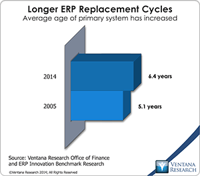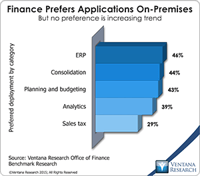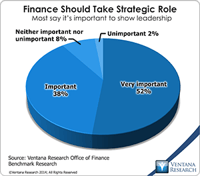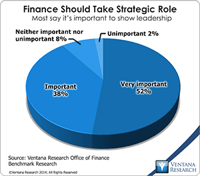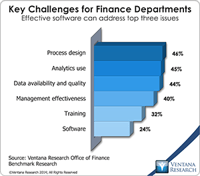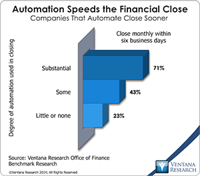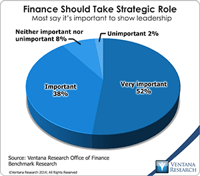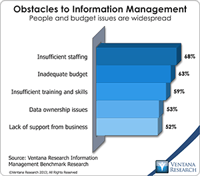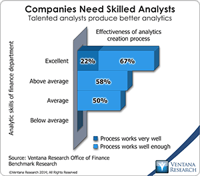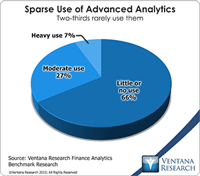The enterprise resource planning (ERP) system is a pillar of nearly every company’s record-keeping and management of business processes. It is essential to the smooth functioning of the accounting and finance functions. In manufacturing and distribution, ERP also can help plan and manage inventory and logistics. Some companies use it to handle human resources functions such as tracking employees, payroll and related costs. Yet despite their ubiquity, ERP systems have evolved little since their...
Read More
Topics:
Big Data,
Microsoft,
SAP,
Social Media,
ERP,
FP&A,
Mobile Technology,
NetSuite,
Office of Finance,
Operational Performance Management (OPM),
Reporting,
close,
closing,
Controller,
dashboard,
Human Capital,
Reconciliation,
Analytics,
Business Intelligence,
Cloud Computing,
Collaboration,
IBM,
Oracle,
Uncategorized,
Business Performance Management (BPM),
CFO,
Data,
finance,
Financial Performance Management (FPM),
Supply Chain Performance Management (SCPM),
Financial Performance Management,
FPM,
Intacct
Whatever Oracle’s cloud strategy had been the past, this year’s OpenWorld conference and trade show made it clear that the company is now all in. In his keynote address, co-CEO Mark Hurd presented predictions for the world of information technology in 2025, when the cloud will be central to companies’ IT environments. While his forecast that two (unnamed) companies will account for 80 percent of the cloud software market 10 years from now is highly improbable, it’s likely that there will be...
Read More
Topics:
Microsoft,
Predictive Analytics,
SAP,
ERP,
FP&A,
Mobile Technology,
NetSuite,
Office of Finance,
Operational Performance Management (OPM),
Reporting,
close,
closing,
Controller,
dashboard,
Human Capital,
Tax,
Analytics,
Business Collaboration,
Business Intelligence,
Cloud Computing,
Collaboration,
IBM,
Oracle,
Business Performance Management (BPM),
CFO,
Customer Performance Management (CPM),
Data,
finance,
Financial Performance Management (FPM),
Sales Performance Management (SPM),
Supply Chain Performance Management (SCPM),
Financial Performance Management,
FPM,
Intacct,
Spreadsheets
Many senior finance executives say they want their department to play a more strategic role in the management and operations of their company. They want Finance to shift its focus from processing transactions to higher-value functions in order to make more substantial contributions to the success of the organization. I use the term “continuous accounting” to represent an approach to managing the accounting cycle that can facilitate the shift by improving the performance of the accounting...
Read More
Topics:
ERP,
FP&A,
Office of Finance,
Reporting,
close,
closing,
Controller,
dashboard,
Tax,
Analytics,
Business Intelligence,
Cloud Computing,
Collaboration,
Business Performance Management (BPM),
CFO,
Data,
finance,
Financial Performance Management (FPM),
Financial Performance Management,
FPM,
Spreadsheets
Last year Ventana Research released our Office of Finance benchmark research. One of the objectives of the project was to assess organizations’ progress in achieving “finance transformation.” This term denotes shifting the focus of CFOs and finance departments from transaction processing toward more strategic, higher-value functions. In the research nine out of 10 participants said that it’s important or very important for the department to take a more strategic role. This objective is both...
Read More
Topics:
Big Data,
Planning,
Predictive Analytics,
Governance,
GRC,
Office of Finance,
Budgeting,
close,
end-to-end,
Tax,
Tax-Datawarehouse,
Analytics,
CIO,
In-memory,
Business Performance Management (BPM),
CFO,
CPQ,
Financial Performance Management (FPM),
Risk,
CEO,
Financial Performance Management,
FPM
Our recently published Office of Finance benchmark research assesses a broad set of functions and capabilities of finance organizations. We asked research participants to identify the most important issues for a finance department to address in a dozen functional areas: accounting, budgeting, cost accounting, customer profitability management, external financial reporting, financial analysis, financial governance and internal audit, management accounting, product profitability management,...
Read More
Topics:
Mobile,
Planning,
Predictive Analytics,
ERP,
FP&A,
Office of Finance,
Reporting,
Self-service,
Budgeting,
close,
closing,
computing,
Controller,
dashboard,
Tax,
Analytics,
Business Intelligence,
Cloud Computing,
Collaboration,
Business Performance Management (BPM),
CFO,
Data,
finance,
Financial Performance Management (FPM),
Financial Performance Management,
FPM,
Microsoft Excel,
Spreadsheets
Our recent Office of Finance benchmark research demonstrates the importance of using automation to execute finance department functions. Information technology systems do at least two things very well that make better use of people’s time, and both of them can substantially improve organizational performance. First, they eliminate the need for people to do repetitive tasks, which frees them to spend time on more valuable work that requires judgment and skill. IT systems also can be programmed...
Read More
Topics:
Big Data,
Mobile,
Planning,
ERP,
FP&A,
Office of Finance,
Reporting,
Self-service,
Budgeting,
close,
closing,
computing,
Controller,
dashboard,
Tax,
Analytics,
Business Analytics,
Business Collaboration,
Business Intelligence,
Cloud Computing,
Collaboration,
Business Performance Management (BPM),
CFO,
Data,
finance,
Financial Performance Management (FPM),
Financial Performance Management,
FPM,
Microsoft Excel,
Spreadsheets
Finance transformation” refers to a longstanding objective: shifting the focus of CFOs and finance departments from transaction processing to more strategic, higher-value functions. Our upcoming Office of Finance benchmark research confirms that most of organizations want their finance department to take a more strategic role in management of the company: nine in 10 participants said that it’s important or very important. (We are using “finance” in its broadest sense, including, for example,...
Read More
Topics:
Big Data,
Mobile,
Performance Management,
Predictive Analytics,
Social Media,
ERP,
FP&A,
Office of Finance,
Reporting,
Management,
close,
closing,
computing,
Controller,
Tax,
Analytics,
Business Analytics,
Business Collaboration,
Cloud Computing,
Collaboration,
Business Performance Management (BPM),
CFO,
finance,
Financial Performance Management (FPM),
Tagetik,
FPM
When applying information technology to drive better business performance, companies and the systems integrators that assist them often underestimate the importance of organizing data management around processes. For example, companies that do not execute their quote-to-cash cycle as an end-to-end process often experience a related set of issues in their sales, marketing, operations, accounting and finance functions that stem from entering the same data into multiple systems. The inability to...
Read More
Topics:
Big Data,
Mobile,
ERP,
Office of Finance,
Operational Performance Management (OPM),
Operations,
Management,
close,
closing,
computing,
end-to-end,
Analytics,
Cloud Computing,
Data Management,
Business Performance Management (BPM),
CRM,
Data,
finance,
Information Applications (IA),
Information Management (IM),
Sales Performance Management (SPM),
Supply Chain Performance Management (SCPM),
FPM
Finance and accounting departments are staffed with numbers-oriented, naturally analytical people. Strong analytic skills are essential if a finance department is to deliver deep insights into performance and visibility into emerging opportunities and challenges. The conclusions of analyses enable fast, fully informed business decisions by executives and managers. Conversely, flawed analyses undermine the performance of a company. So it was good news that in our Office of Finance benchmark...
Read More
Topics:
Big Data,
Mobile,
Planning,
Predictive Analytics,
ERP,
FP&A,
Office of Finance,
Reporting,
Self-service,
Budgeting,
close,
closing,
computing,
Controller,
dashboard,
Tax,
Analytics,
Business Analytics,
Business Intelligence,
Cloud Computing,
Collaboration,
Business Performance Management (BPM),
CFO,
Data,
finance,
Financial Performance Management (FPM),
Tagetik,
Financial Performance Management,
FPM,
Microsoft Excel,
Spreadsheets
“What’s next?” is the perennially insistent question in information technology. One common observation about the industry holds that cycles of innovation alternate between hardware and software. New types and forms of hardware enable innovations in software that utilize the power of that hardware. These innovations create new markets, alter consumer behavior and change how work is performed. This, in turn, sets the stage for new types and forms of hardware that complement these emerging product...
Read More
Topics:
Mobile,
Performance Management,
Predictive Analytics,
ERP,
Office of Finance,
Operational Performance Management (OPM),
Reporting,
Wearable Computing,
Management,
close,
closing,
computing,
Analytics,
Business Analytics,
Business Collaboration,
Cloud Computing,
Business Performance Management (BPM),
Customer Performance Management (CPM),
finance,
Financial Performance Management (FPM),
Sales Performance Management (SPM),
Supply Chain Performance Management (SCPM),
Workforce Performance Management (WPM),
FPM
